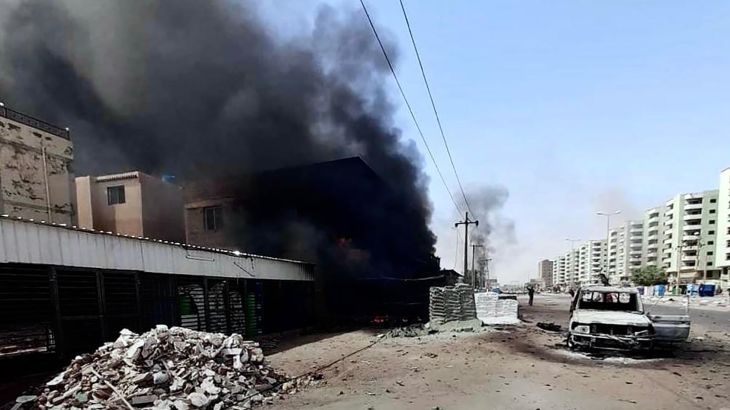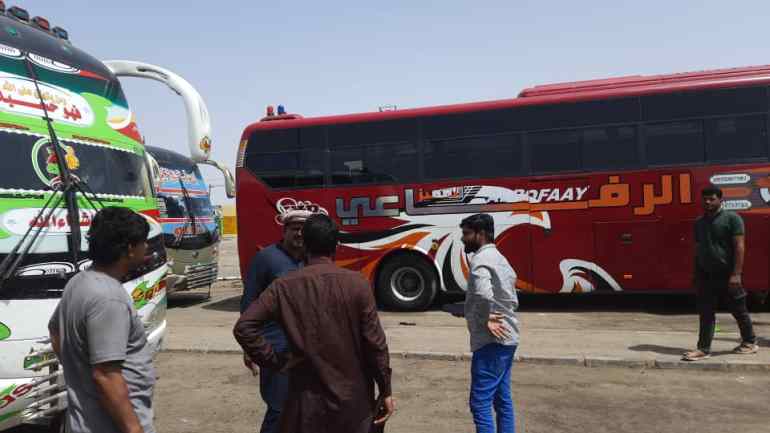Journey to safety: Pakistanis escaping the violence in Sudan
Emotions mixed as they leave their homes and travel 800km (500 miles) from Khartoum to Port Sudan.

Amid the chaos of the intensifying conflict in Sudan, 40-year-old Pakistani marketing executive Rana Usman faced an urgent dilemma.
After calling Khartoum home for nearly a decade, he had to find a way to navigate the treacherous streets of the capital, traversing from the northern suburbs to the southern reaches where the Pakistani embassy promised sanctuary for him and his family.
Keep reading
list of 4 itemsSudan fighting in its 11th day: A list of key events
Sudan factions agree to 72-hour ceasefire as foreigners evacuated
How my family and I left everything and fled Sudan for Egypt
“My mother, my wife, as well as extended family, we did not know how to cross over to the Pakistani embassy,” Usman told Al Jazeera on Tuesday. “There was a pitched battle going on throughout. We kept hearing air strikes and bursts of bullets all day. Smoke kept billowing throughout the day. We even had stray bullets in our house. We had no way of leaving our home,”
On Sunday morning, Usman’s cousin was able to arrange for a truck and a driver willing to transport him, his immediate family, and dozens of other relatives. It took all of Usman’s courage to board the truck and make the journey through the violent streets to the embassy.
“The responsibility fell on me to transport 30 to 35 people to the embassy. I was so stressed that I just completely broke down. But my cousin, who had arranged the truck, urged me that there is no other way, and I must show courage. There was no other choice. Staying back in Khartoum was not an option,” Usman said.
After arriving safely at the embassy, he and his family joined a convoy of seven buses with more than 400 Pakistanis on board. They departed the capital a few hours later on an 800km (500-mile) journey to the northeastern city of Port Sudan. The trip took 20 hours and they arrived on Monday morning.
Since fighting erupted in Sudan between the army and the Rapid Support Forces (RSF) paramilitary group on April 15, at least 427 people have been killed and residential areas have been turned into war zones. Millions of people remain trapped in their homes in the capital Khartoum, and they are running short on food and water.
Sudan’s army and the RSF have agreed to but not abided by several temporary truce deals over the past week.
Before the fighting began, there were roughly 1,500 Pakistanis living in Sudan. As the battle enters its 11th day, more than 700 Pakistanis have so far managed to reach Port Sudan, including approximately 200 who arrived there on Tuesday, according to Pakistan’s foreign ministry.

“After the ceasefire on April 21 allowed us a safe window, we rushed to take our citizens out of Khartoum to ensure their passage to Pakistan,” Mumtaz Zahra Baloch, a spokesperson for Pakistan’s foreign office, told Al Jazeera.
Muhammed Ahsan Sami, a 39-year-old Pakistani chemical engineer living in Khartoum since 2017, was also part of the convoy of buses that arrived in Port Sudan on Monday.
Sami told Al Jazeera that the convoy was stopped multiple times by RSF troops and the Sudanese army at checkpoints along the roads. Fortunately, he said, the fighters did not harass or threaten the passengers.
Joined by his wife, son, and daughter, Sami said that the Pakistani embassy in Khartoum was extremely helpful in carrying out the evacuation process, but that the journey was grim and most of the passengers either kept quiet or prayed for their safety.
“The embassy had told us to keep water and dry fruit rations with us. They did not charge a single penny from anybody for the entire thing. But people were obviously very scared. We just kept praying throughout our journey and tried to give solace and support to others travelling with us,” Sami said.
🔊: PR NO. 7️⃣7️⃣/2️⃣0️⃣2️⃣3️⃣
Statement by Foreign Minister Bilawal Bhutto Zardari on the evacuation of Pakistani nationals from Sudan
🔗⬇️https://t.co/OaMO1YcsJv pic.twitter.com/0uMABXBdHx
— Spokesperson 🇵🇰 MoFA (@ForeignOfficePk) April 25, 2023
Bilawal Bhutto Zardari, Pakistan’s foreign minister, said in a statement on Tuesday that Pakistan was coordinating with other countries to safely evacuate its citizens.
“Ambassador Meer Bahrose Regi’s team in Khartoum and Port Sudan are working day and night to facilitate the stay of Pakistanis who are still in Sudan until their evacuation to Pakistan. We remain engaged with friendly countries in the region especially the Kingdom of Saudi Arabia to facilitate this process,” Bhutto Zardari said.
Struggling to keep his composure, Sami broke down as he recalled his journey from Khartoum to Port Sudan.
“I tried to keep my emotions in check during the entire process of leaving but as the last bus left, I just couldn’t control myself and started crying. It was such a traumatic experience for us,” he said.
“My children had grown up in this city and now we could not carry back a single toy for them. We built our entire life. We made a home out of an apartment. And now just to leave it all, just like that, and no certainty if we will ever return, this is just so difficult for me to process.”
Usman, the marketing executive, also had mixed emotions about leaving the Sudanese capital.
“I work for a Pakistani industrialist here. I have many extended family members living here and for us, this place is home. We do go to Pakistan for vacations but always try to return as soon as possible,” he said. “This is where we feel at home. This is where we find peace.”
He added that the hospitality of the locals was unparalleled and that strangers reached out to help when his family reached Port Sudan.
“My daughter left a message on Facebook asking for temporary accommodation. A young man reached out to her and later spoke to me. He came himself to pick my family up and took us to his apartment, offering us to stay there for no cost. People here just keep telling us, we are grateful you are safe.”